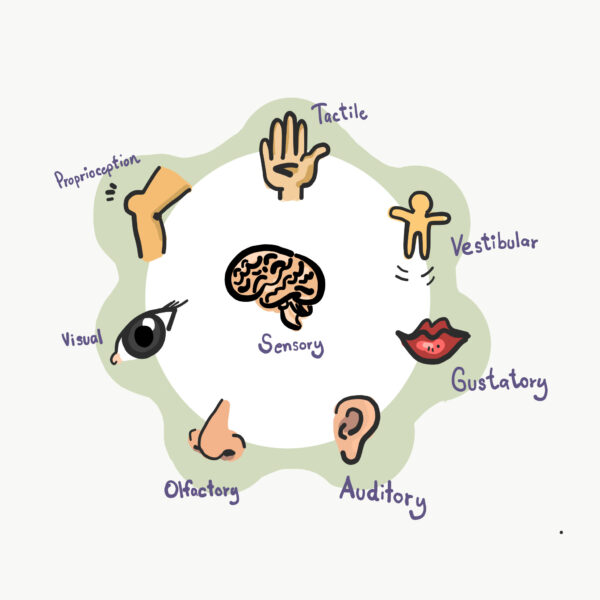Recently CSTC has been getting lots of referrals, which is wonderful. With so many new clients we are constantly learning new things and new ways to support growth within our clients. Sensory processing disorder is among the most common diagnoses treated within our center. This is treated by occupational therapists (OTs), but it is important for SLPs and PTs to understand the sensory processing systems in order to support our clients as best we can. Let’s dive in.

There are seven sensory systems: proprioceptive, vestibular, tactile, visual, auditory, gustatory, and olfactory. Difficulty processing information through these systems can be inconvenient at best and debilitating at worst. Below I will touch on vestibular, proprioceptive, tactile, visual, and auditory.
The proprioceptive system is responsible for tracking where a body is in the space around it. Any time someone’s joints are compressed or pulled apart, or when they push or pull an object, this system begins to work. It helps us to understand the force we use in daily tasks.

The vestibular system is responsible for balance and movement; found in the inner ear (cochlea). If you’ve ever had vertigo you know what a disruption to this system feels like. It can make you fee nauseous, dizzy, and downright awful. This system relays messages to the brain so it can orient where a body is moving even if it’s at a different angle or in a different direction.

The tactile system is our sense of touch. This system tells us when we’ve touched something or when something else has touched us. Different types of touch can have different effects on a body. Light vs. deep pressure touch can create different results for different people, but for the most part light touch is alerting and deep pressure is calming.

The visual system is responsible for allowing us to see things as they are. This system is responsible for filtering out unimportant stimuli so we can focus on the task at hand. This is the system that allows you to find all the forks in your mess of silverware while unloading the dishwasher, finishing worksheets, doing puzzles, etc.


The auditory system is obviously about hearing, but similar to the visual system your auditory system needs to be able to filter out the background noise. It also helps you to localize sound so you know where it’s coming from. Personally, I have a terrible time with this especially when I hear an ambulance siren coming toward me. When this system is not working properly it can be very disorienting.

To learn more about the sensory systems and how they work together check out Mama OT’s blog post below:
An Introduction to the Sensory Systems
So, how does this all play into communication? Have you heard of Maslow the psychologist and his experiments with monkeys? From these experiments he deduced a hierarchy of needs that need to be met before a person can fully participate in academic learning, reach higher goals, etc. Here’s a link in case you’d like to learn more:
https://www.simplypsychology.org/maslow.html
The sensory systems work in a similar way in that if even one is dysregulated it can be extremely difficult to focus on anything. Think about the annoying kid in class who won’t stop tapping his pencil, the fan blowing on you when you’re already feeling on edge because of your itchy sweater, then add in the flickering light above you which your eyes can’t seem to filter out. You’re dealing with all of this, then you’re asked to follow a 3 direction with a concept you already struggle with like before/after. Forget it. It’s not happening. There’s no way your brain can focus enough to retain all the verbal information and carry out the task. Your sensory needs are not under control. You are not ready to learn.
There are kids and adults in our lives who deal with these things every single day and it’s HARD. Teachers: make the accommodations. Therapists: do your best to provide a few minutes of time to regulate systems at the beginning of sessions. Everyone: give grace and be kind.





